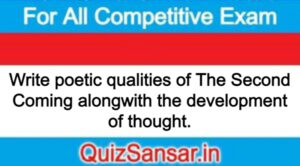
Write poetic qualities of The Second Coming alongwith the development of thought.
Write poetic qualities of The Second Coming alongwith the development of thought.
Or
Write a critical appreciation of The Second Coming.
Ans.
Introduction
The poem, The Second Coming was first published in The Dial an American Magazine, in Nov. 1920. When this poem was written, the poet was annoyed by the Easter Rebellion of 1916, the Irish Civil War that followed it and European World War of 1914-18. Old time was finishing All around there was anarchy. People were fighting for materialistic pursuits and the persons who were called the best ones in the society had lost all convictions. He thought that a full circle of the moon takes two thousand years to change the complete history. Last two thousand years have been of anarchy and the poet looks a new vision for the Second coming of God. According to Greek poet looks a new vision for the Second coming of God. According to Greek mythology in 2000 B.C.. Led a the mother of Helen, had four children by her union with Zeus, a god who appeared in the form of swan. Nearly at that time Jesus took birth. This period seems to come after two thousand years. Now this period has passed and the poet seems to think that God will come again on the earth.
Development of Thought
In the poem The Second Coming the poet feels that this universe is a cycle of time and nearly after two thousand years a change comes in the history of the world. Today mankind has lost old values, administration and faith. Therefore, a change is at hand. Mankind has met to the dishonesty. There is a complete disintegration of soul. We do not listen the voice of our God. A change is about to take place on the earth that the God will take rebirth in the shape of wild beast. He will have some figure of lion’s body and man’s head bearing a beard. Sight of this Spiritus Mundi troubles to the sight of the poet. He will come from some desert and the indignant birds will be hovering upon him. He will gradually move towards Bethlehem to take birth, probably. These twenty centuries of mankind passed in the stony sleep, rocking cradle and ignorancy.
Imagery
The Second Coming is a famous and startling poem. It has two parts. One, of eight beginning lines, and, second part starts by line number nine. First part of the poem is not naturalistic passage. Eighter the falcon or Falconer are bodily image or symbolic or they are cosmic image. Simultaneously, the anarchy of the world, things disintegrating from the turning center and blood-dimmed tide are the images related to occult. It may be a metaphysical meaning of war. The last two lines of the poem sound most naturalistic, and they are the climax of the poem, and we have to dwell upon them for the meaning of the poem. It is not clear anywhere what Spiritus Mundi is, whether it is conscious imagination or unconscious. It may be said that it is a store-house of man’s image which have ceased to be a property of any personality or spirit. The physical construction of the beast seems similar to the Vedic God. Narsingh who came on earth to kill Hiranyakashyap. But this mythology does not say anything about the Second coming after any fixed period.
Language: Supernatural Elements
Yeats in his poem The Second Coming brought out his beliers into conception of the universe. Some of his phrases and words flow from the personal doctrine and some from his sense of the world about him. The Ceremony of innocence’ makes his phrase attractive because in the materialistic world people have lost faith. The phrase ‘falcon and Falconer makes the poem supernatural in the sense that the God will take birth in the shape of a beast. birds will be indignant and all it will take place in some desert. Mankind is to meet punishment because soul does not listen to the old values. The poet may be referring civil wars through the poem because all around there is an anarchy. This poem may be interpreted in another meaning too. It is not clear what the poet had in his brain about the process of revelation.
-
Write the critical appreciation of the poem No. 12 entitled Far Below Flowed.
-
Write the critical appreciation of the poem No. 11 entitled Leave this Chanting.






